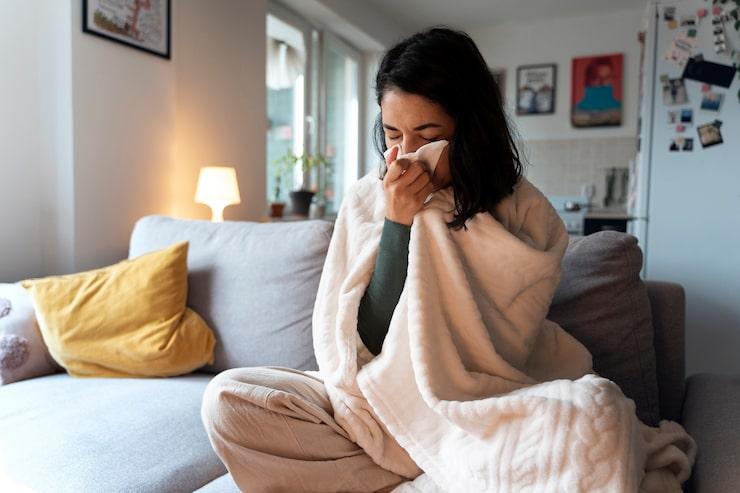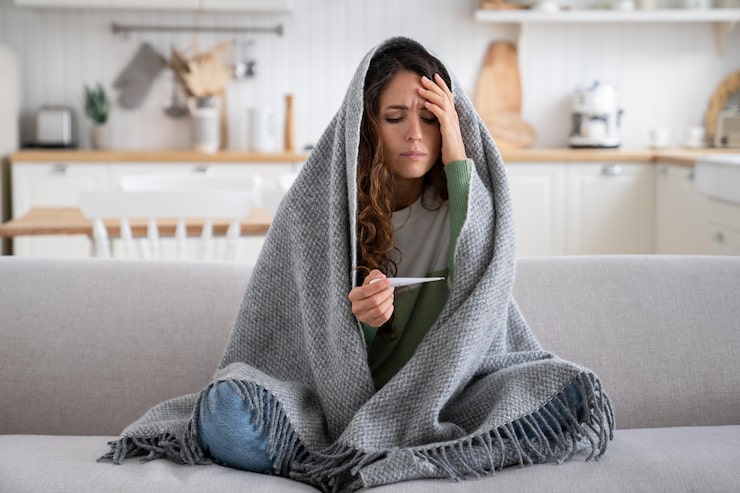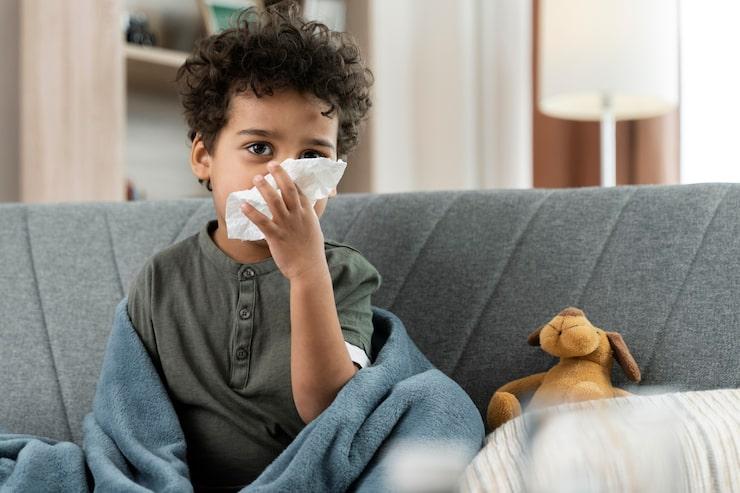Preventive Measures Against Seasonal Sickness: Stay Healthy All Year Round
a woman with a common seasonal cold
There is beauty in every season, from the cold winds of winter to the warm rains of summer to the chilling breezes of winter. But every time the seasons change, a new wave of illnesses comes along. Flu, coughs, colds, fevers, viral illnesses, and allergies usually get worse during these fluctuations. This affects people of all ages.
Your body has a hard time adjusting to changes in weather, temperature, and humidity, which might make you sick in the winter. You might be more likely to get sick since your immune system might not perform as well for a while. A few simple steps can help you and your family stay healthy.
The doctors at Prakash Hospital in Noida, who specialize in internal medicine, say that the best way to stay well for a long time is to avoid getting sick in the first place. This is a full list of tips for staying healthy in the winter.
How to Know About Seasonal Illness
When the weather changes from one season to the next, people can get seasonal illnesses, which are diseases or allergies. These illnesses, which vary with the seasons, can affect the skin, digestive, and respiratory systems.
Some common examples are:
- Dengue, malaria, typhoid, and cholera are diseases that may occur during the monsoon.
- Bronchitis, pneumonia, the flu, and the cold are all ailments that happen in the winter.
- Summer problems include heatstroke, dehydration, food poisoning, and rashes.
- Allergies in the spring might make you sneeze, have a runny nose, and watery eyes.
The body needs time to adjust to sudden changes in temperature or humidity. During this time of change, the immune system may temporarily not work as well, making it easier for viruses and bacteria to sneak in.
Why It's Important to Get Preventive Care
Not only can preventing seasonal sickness prevent you from getting sick, but it also protects others, especially kids, older people, and individuals with long-term health concerns.
- Good care to prevent:
- Naturally strengthens the immune system
- Reduces the need for drugs
- Stops issues that can occur when infections recur.
- Improves overall health
At Prakash Hospital in Noida, our specialists say you should take a proactive, seasonal approach to your health, preparing your body for each shift in the weather.
Preventative Strategies
a woman with a common seasonal cold and fever
The greatest strategies to stay healthy in the winter
Here are some doctor-approved ways to stay healthy year-round.
1. Naturally strengthen your immune system
- Your immune system is the best defense against seasonal infections. A balanced diet will make it stronger: You should eat whole grains, proteins, fruits, and vegetables that are still fresh. Include foods that boost the immune system, such as garlic, turmeric, spinach, citrus fruits, and yogurt.
- To rid your body of toxins and keep your mucous membranes moist, drink 2 to 3 liters of water every day. This can help prevent infections.
- Get adequate sleep: Aim for 7 to 8 hours of undisturbed sleep each night so your body can mend and prepare for the next day.
- Get frequent exercise. Moderate activity, such as walking or yoga, supports circulation and strengthens your immune system.
2. Keep clean
- Dirty hands, air, or surfaces are common ways for infections to spread in the winter and summer.
- To decrease your risk, follow these recommendations for cleanliness:
- Wash your hands with soap and water for at least 20 seconds every day.
- If you don't have soap, use alcohol-based sanitizers instead.
- If you can help it, don't touch your eyes, nose, or mouth.
- Keep your personal items, such as towels, utensils, and water bottles, apart.
- Regularly clean and disinfect frequently touched surfaces, such as phones, doorknobs, and keyboards.
- These little things can have a significant effect on how illnesses spread.
3. Dress for the season.
- When the weather changes, your body temperature can swing up and down, making it more likely you'll get a cold or a fever.
- In the winter, wear layers to be warm and protect yourself from harsh winds.
- In the heat, wear cotton clothes that let air circulate to stay cool and dry.
- Don't walk through still water during the monsoon to avoid acquiring fungal infections and stay dry.
- Always take a light jacket or umbrella with you so you don't get wet in bad weather.
4. Get your vaccines on time
- Vaccines are particularly crucial for preventing seasonal illnesses, including pneumonia, the flu, and typhoid.
- Our preventive care experts at Prakash Hospital in Noida recommend getting a flu shot every year before winter.
- Vaccines for hepatitis and typhoid: This is especially important before the monsoon.
- Pneumococcal vaccination is recommended for elderly people and those with long-term lung disease.
- Based on your age and condition, talk to your doctor about which vaccines are best for you.
5. Make sure the air inside is clean
When the weather changes, people tend to stay inside more, which can make breathing more difficult due to dust, mold, and other allergens.
- To improve the air within, keep your surroundings clean and well-ventilated.
- Use air purifiers if you have to.
- Don't smoke or burn incense inside
- Clean air conditioners, fans, and filters regularly.
- Good indoor air quality can help you avoid sinus infections, asthma attacks, and allergic rhinitis.
6. All year round, drink enough water.
Not drinking enough water can make your immune system less effective, cause headaches, leave you feeling weary, and make your skin dry.
- Drink enough water even if you don't feel thirsty.
- Drinking coconut water, herbal teas, and fresh juices is excellent for you.
- Don't consume too much coffee or soda with added sugar.
- Staying hydrated supports every part of the body, from maintaining a consistent temperature to transporting nutrients.
7. Eat items that are in season and fresh
- Nature gives your body what it needs in every season. Eating in-season fruits and vegetables is better for your health and immune system.
- You can have watermelon, cucumber, mint, curd, and buttermilk in the summer.
- During the monsoon, things like bitter gourd, bottle gourd, turmeric, and ginger flourish.
- You can consume carrots, beets, spinach, citrus fruits, and amla in the winter.
- Don't eat street food or uncovered food, especially when it's raining, because it can harbor germs and viruses.
8. Don't alter the temperature too fast
- You can catch a cold or a throat infection by going from a hot outdoor environment to a cool indoor environment, or vice versa.
- Before you adjust the temperature, let your body get used to it for a few minutes.
9. Get checkups at the doctor's office often.
Regular health checkups can help detect and prevent many seasonal illnesses early.
- Our preventive health checkup packages at Prakash Hospital in Noida include testing for a full blood count (CBC)
- How well the kidneys and liver are working
- Blood sugar levels
- Levels of vitamins and immunity
- Regular checkups can help uncover problems and prevent infections from recurring.
10. Deal with stress
When you're under a lot of stress for a long time, your immune system gets weaker, which makes you more prone to getting sick in the winter.
- Meditation and mindfulness are two ways to relax.
- Deep breathing methods
- Being outside in nature
- Sticking to a healthy daily schedule
- Mental health is a big part of remaining healthy.
More Help for Kids and Seniors
child overtaken by a common seasonal cold
When the seasons change, both kids and older individuals are more likely to get sick.
- Make sure your kids consume a healthy diet, get enough sleep, and stay clean. If they appear like they have an infection, don't send them to school.
- Make sure older folks get their vaccinations on schedule, stay warm in winter, and drink enough water in summer. As soon as they start to feel sick, they should go to the doctor.
- At Prakash Hospital, we offer specialized preventive care for kids and elders to keep them healthy at every stage of life.
When to see a doctor
If you have a cough or fever that won't go away, you need to see a doctor immediately.
- Breathing is hard
- Feeling weak or exhausted all of a sudden
- Rashes or skin irritation that doesn't make sense
- Having diarrhea or throwing up
- People with diabetes, asthma, or heart disease are more likely to develop issues if they don't obtain therapy right away.
Prakash Hospital in Noida delivers services to keep people healthy.
Our experienced doctors and specialists at Prakash Hospital can help you with both seasonal and viral illnesses.
- We do a few things, such as health checks, to stop problems.
- Shot programs
- Advice on diet and lifestyle
- Advanced care for infections
- Take care of your allergies and breathing.
- Our goal is not only to treat illness, but also to keep you healthy year-round by raising awareness and preventing illness before it starts.
Conclusion: The safest method is to avoid trouble.
You'll likely become sick in the winter, but you don't have to. Making minor changes to your daily routine, such as eating well, staying clean, and drinking enough water, can help your body fight off illness.
At Prakash Hospital in Noida, we believe the best way to stay healthy is to avoid problems in the first place. We have a team of family doctors, internal medicine experts, and nutritionists who work together to teach people how to stay healthy year-round.
To stay one step ahead of seasonal illnesses, boost your immune system, live a healthy lifestyle, and schedule your routine checkup at Prakash Hospital today.
Your health is the best way to protect yourself. Every season, take care of it.



